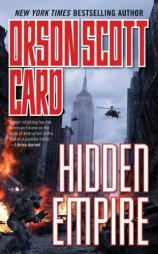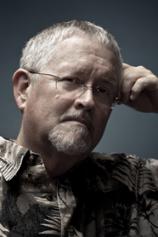Hidden Empire
Review
Hidden Empire
“You know that I can’t do this without reducing
democracy to a sham, at least for a while,” said
Torrent.
“It already is,” said Cole. “Whatever we
have, it hasn’t been democracy for decades.”
Orson Scott Card has made a solid name for himself with the
futuristic vision of his Ender series and the magic of his
Alvin Maker novels. With HIDDEN EMPIRE, Card forgoes mysticism and
science fiction advancements to once again settle into the near
future landscape of an America coming out of a new civil war and a
world in flux. In doing so, he successfully presents a haunting
vision of an America as it is…or as it could be.
HIDDEN EMPIRE opens with Chinma, a young Nigerian boy who is the
lesser son of his family. He is beaten by his siblings and
generally ignored by his elders. He seems to be slower than the
others in most regards except for one skill --- he is a master at
catching monkeys, and makes good money in capturing them for the
scientists. On the fateful afternoon that his brother is bitten and
he himself is sneezed on, Chinma’s world --- and the world as
a whole --- is changed for all time. These particular monkeys are
sick, and their virus quickly claims Chinma’s brother and
those in contact with him. It is not long before the “monkey
sickness” is spreading at a virulent pace, leaving an
astounding body count in its wake.
Averell Torrent, a political scientist and adviser who found
himself able to take advantage of a collapsed government, is the
new President of the United States. As news of the “monkey
sickness” reaches his desk, he makes a decision to quarantine
the entire continent of Africa in a bid to hold the virus at bay.
His command is met with strong resistance from Christians who
protest that they should be permitted the opportunity to travel to
Africa as aid workers. He also meets Chinma, who has been granted
asylum in the U.S. after watching an army of guerrillas sent by the
Nigerian government murder the survivors of his village. He is now
the last of his people. And having had the sickness already, he is
immune.
Chinma volunteers to go back to Nigeria with the aid workers who
are finally permitted to help. He is the only one who knows the
full life cycle of the virus. Cecily Malich, an adviser to
President Torrent, resigns her position to go with her son, whose
religious belief calls him to his duty as a servant to the sick. At
the same time, Torrent has sent troops --- led by Bartholomew
“Cole” Coleman --- with impressive new military
equipment to secure the scientists and aid workers and protect them
from harm. When the sickness infiltrates the military
establishment, however, danger approaches from militants, and some
begin to wonder if Torrent doesn’t have more of a hand in the
situation than he lets on.
Card really excels in presenting the story of Chinma, easily the
most magnetic of the characters in HIDDEN EMPIRE. The tale is rife
with both despair and hope, and when the book focuses on his
fragment of the story, it is very hard to put down. The torment of
the villagers across the nation of Nigeria is equally compelling,
and the most saddening is that much goes on within the novel that
parallels a harsh reality for the people of Africa, a reality that
barely ever makes the news in our country.
The conspiratorial element --- with the soldiers under Cole
questioning the intent and involvement of the President --- is less
prevalent in the story, which is a good thing. While it is a major
concern and does have a resolution/revelation within the concluding
chapters, it is best served as being no more than a peripheral
element that weaves in and out of the greater concern, which is the
virus and the potential devastating effect it will have on the
world should it move out of Africa.
HIDDEN EMPIRE has heroes, to be sure; its villains are less
conspicuous. They are gray, conflicted, and undertake what seem to
be offensive courses of action that are done for the betterment of
the good. It is a grand paradox, and so with the tinge of disgust,
one might feel there is also a small portion of understanding.
Orson Scott Card has done such a spectacular job in taking the
angry, volatile political climate of our present and blowing it
open into an even more hostile but conceivable future, which makes
it somewhat frightening at the same time. He truly pulls no
punches, and the result is a harrowing and haunting examination of
a possible landscape of governmental collapse, rebirth, plague and
panic. More importantly, though, is that within all of the gloom
and despair, there are beacons of light worth following, which
makes HIDDEN EMPIRE more than worth the read.
Reviewed by Stephen Hubbard on January 22, 2011
Hidden Empire
- Publication Date: December 28, 2010
- Genres: Fiction, Science Fiction
- Mass Market Paperback: 464 pages
- Publisher: Tor Books
- ISBN-10: 0765359715
- ISBN-13: 9780765359711





